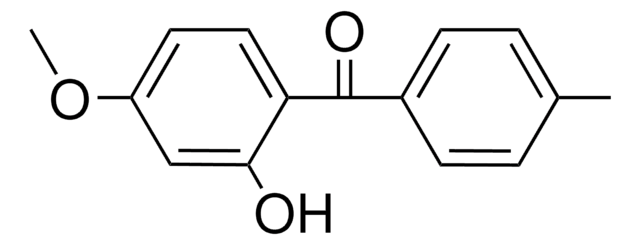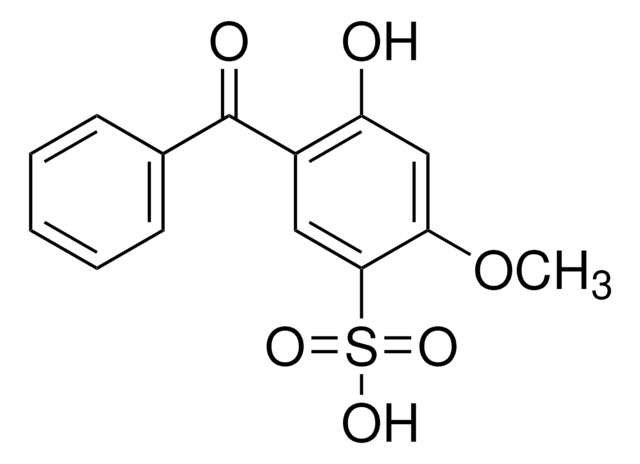H36206
2-Hydroxy-4-methoxybenzophenone
98%
Synonym(s):
Oxybenzone
About This Item
Recommended Products
Quality Level
Assay
98%
bp
150-160 °C/5 mmHg (lit.)
mp
62-64 °C (lit.)
solubility
95% ethanol: soluble 50 mg/mL, clear, colorless
SMILES string
COc1ccc(c(O)c1)C(=O)c2ccccc2
InChI
1S/C14H12O3/c1-17-11-7-8-12(13(15)9-11)14(16)10-5-3-2-4-6-10/h2-9,15H,1H3
InChI key
DXGLGDHPHMLXJC-UHFFFAOYSA-N
Looking for similar products? Visit Product Comparison Guide
Related Categories
General description
Application
- Synthesis of as poly[(2-hydroxy-4-methoxybenzophenone) propylene] (HMBP-PD), a polymeric ligand (resin) used for the synthesis of metal/ligand polychelates (metal-polymer complexes).
- Analytical reagent for the gravimetric determination of Cu(II).
Signal Word
Warning
Hazard Statements
Precautionary Statements
Hazard Classifications
Aquatic Acute 1 - Aquatic Chronic 2
Storage Class Code
13 - Non Combustible Solids
WGK
WGK 2
Flash Point(F)
212.0 °F - closed cup
Flash Point(C)
100 °C - closed cup
Personal Protective Equipment
Regulatory Listings
Regulatory Listings are mainly provided for chemical products. Only limited information can be provided here for non-chemical products. No entry means none of the components are listed. It is the user’s obligation to ensure the safe and legal use of the product.
ISHL Indicated Name
Substances Subject to be Indicated Names
ISHL Notified Names
Substances Subject to be Notified Names
Choose from one of the most recent versions:
Already Own This Product?
Find documentation for the products that you have recently purchased in the Document Library.
Customers Also Viewed
Our team of scientists has experience in all areas of research including Life Science, Material Science, Chemical Synthesis, Chromatography, Analytical and many others.
Contact Technical Service













